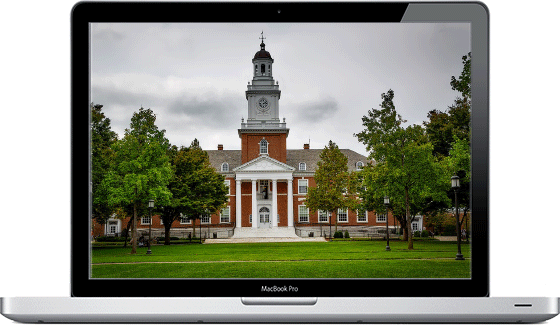Johns Hopkins University
Captioning and Transcription Policies at Johns Hopkins Graduate School of Engineering
Matt Bochniak acts as the Multimedia Supervisor for the Graduate School of Engineering at Johns Hopkins, a graduate program with 11 fully online Master’s degrees. There are currently about 2,000 students enrolled in fully online courses. The Graduate School of Engineering has over 5,700 videos in their current catalog and adds about 100 videos per week, each around 15 minutes in length.
The program’s current policy is that all videos in an online course will be captioned when a student enrolled in that course makes a formal request for closed captioning. There is also an open door policy with professors; any faculty member that requests closed captioning for their course will be accommodated.
In the Graduate School of Engineering, captioning responsibilities are delegated across the entire instructional technology staff. The faculty works with the instructional designers to develop their online courses; a week before a class is held, the program submits any videos that require closed captioning to 3Play Media. Johns Hopkins also places the transcripts of the captioned videos on Blackboard for download.
The Future of Closed Captioning and Transcription at Johns Hopkins
Matt Bochniak believes that mandatory captioning for all video content in higher education is inevitable; it’s just a matter of time. Because the Graduate School of Engineering captions by request, many videos in their catalog have not yet been captioned. The prediction of more stringent captioning requirements means that, like most educational institutions, Johns Hopkins must begin to prepare for the cost of captioning additional video content. While there is a cost to captioning, Johns Hopkins has found that captions provide numerous benefits to their students outside of accessibility for the deaf and hard of hearing.
The Benefits of Closed Captioning and Transcription
As Matt Bochniak put it, “One of the benefits of having courses closed captioned is that the student can both hear the instructor talk as well as read on the screen, so you’re getting two ways of that data coming into the student, and I think that facilitates learning.” The benefits of closed captioning transcend accessibility requirements.
For a program like the Graduate School of Engineering at Johns Hopkins, which has students from all over the world, transcripts and captions make video content more comprehensible to students who know English as a second language. Transcripts also provide a great basis for translation into other languages. Captions allow students to view video content in sound sensitive environments, like libraries. Further, downloadable transcripts are helpful for students to use as study guides and for highlighting important parts of lectures.

Check out our plans and pricing.

